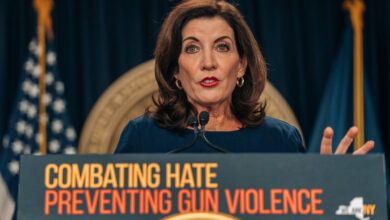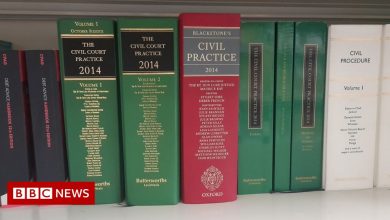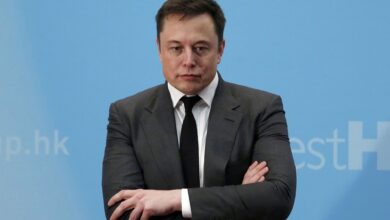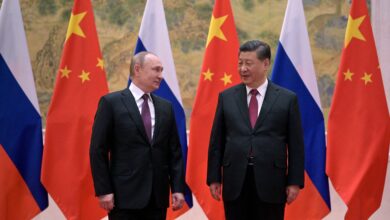Russia hints at change in stance on use of nuclear weapons
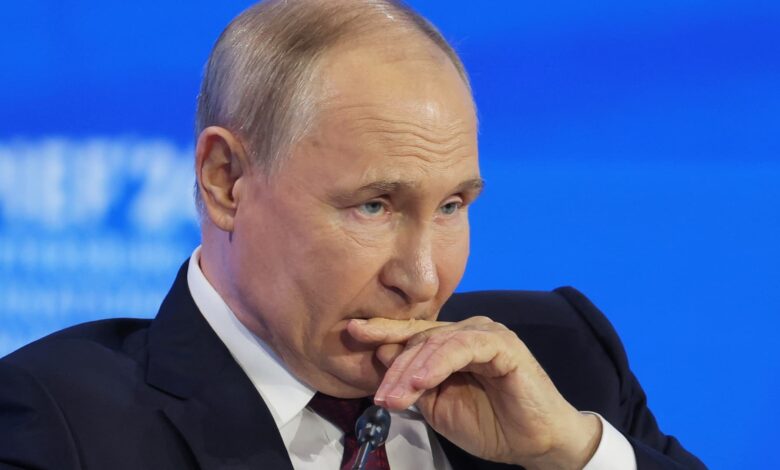
Russian President Vladimir Putin attends a plenary session of the St. Petersburg International Economic Forum (SPIEF) in Saint Petersburg, Russia June 7, 2024.
Anton Vaganov | Reuters
Russia has once again hinted that it will change its official stance on the use of nuclear weapons, amid continued Ukrainian incursions into the Kursk border region.
Deputy Foreign Minister Sergei Ryabkov said on Sunday that Russia is in the process of revising its nuclear doctrine, which outlines the conditions under which nuclear weapons could be used, because of what Russia sees as an “escalation” in the Western-backed war with Ukraine.
Russia accuses the West of encouraging Ukraine’s cross-border offensive, which has seized nearly 500 square miles of Russian territory since it began on August 6. Ukraine’s NATO allies deny having prior knowledge of the operation or taking part in the attack.
Speaking to Russian state news agency TASS on Sunday, Ryabkov said work was “at an advanced stage” to revise Russia’s nuclear doctrine regarding the use of nuclear weapons.
“There is a clear direction for making adjustments, which is also determined by the study and analysis of the experience of conflict development in recent years, including… everything related to the escalation process of our Western opponents in relation to the SVO [special military operation]”, Ryabkov said, referring to Russia’s ongoing invasion of Ukraine.
Ryabkov did not specify when any changes would be completed, saying that “the timing of completion of this work is a rather difficult question, since we are talking about the most important aspects of ensuring our national security,” he said in comments translated by Google.
Terms of Use
Russia’s threat to use nuclear weapons is not new, but Ryabkov’s comments echo recent statements. carried out by senior officials And Kremlinindicates that Russia is preparing the ground for changes in state policy regarding the acceptable conditions for the use of nuclear weapons.
Ukraine’s incursion into Russian territory and targeting of military facilities and infrastructure with Western-supplied weapons, especially long-range missiles, also raises doubts about whether Moscow would consider using nuclear weapons to defend its territory.
According to the current situation, Russian nuclear doctrine declared that Russia “reserves the right to use nuclear weapons in response to the use of nuclear weapons and other weapons of mass destruction against Russia and/or its allies, as well as in the event of aggression against the Russian Federation with conventional weapons, when the existence of the state is threatened.”
Yars ballistic missiles take part in a rehearsal for the Victory Day parade in Moscow, Russia, May 7, 2022.
Snow White | Xinhua | Getty Images
According to a Google translation, the document says other conditions that could dictate Russia’s use of nuclear weapons include “receiving reliable information about the launch of ballistic missiles attacking the territory of the Russian Federation and (or) its allies,” as well as “enemy impact on extremely important military or state facilities.”
In its 2020 policy, Russia still describes nuclear weapons as “a deterrent” and their use as “an extreme and necessary measure.” Russia calls its nuclear doctrine “defensive in nature” and says it “will make all necessary efforts to reduce the nuclear threat and prevent the aggravation of relations between states that could lead to military conflicts, including nuclear ones.”
Since Russia invaded Ukraine in February 2022, Russian President Vladimir Putin has repeatedly reiterated the message that Moscow will not hesitate to deploy such weapons if the country’s territorial integrity and sovereignty are threatened.
In May, Russia held tactical nuclear weapons exercises near the Ukrainian border and has also deployed such weapons in the territory of ally Belarus.
Military vehicles of Russia’s Leningrad Military District units move along a road during the second stage of the tactical nuclear exercise of the Russian and Belarusian armed forces at an undisclosed location, in this still image from video released June 12, 2024.
Russian Defense Ministry | Via Reuters
Tactical or non-strategic nuclear weapons are designed for use on the battlefield and are capable of destroying specific targets, such as military bases or training centers.
While they are less destructive than strategic nuclear weapons that can wipe out entire cities, the deployment of such weapons would represent a serious escalation in the war and raise concerns about a direct confrontation with the West.
Putin has also expressed an intention to change the conditions for using such weapons, declaring in June that the country’s nuclear doctrine is a “living instrument” that can be changed.
“We should be clear about what constitutes use or non-use. [of nuclear weapons]as well as the specific scenarios in which they could be used. We have a nuclear doctrine, and everything is clearly stated there… It states: nuclear weapons can only be used in exceptional cases – when there is a threat to the sovereignty and territorial integrity of the country, in exceptional cases,” Putin saidspeaking at the St Petersburg International Economic Forum in June.
“I do not believe that this moment has come – there is no need for it. However, this doctrine is a living instrument, and we are closely monitoring developments in the world around us, and we do not rule out the possibility of making changes to this doctrine,” Putin added.
The urgency of the invasion
Russia appears to be preparing its domestic and international public for changes in state policy on the use of nuclear weapons since Ukraine launched an ambitious cross-border raid into Russia’s Kursk border region nearly a month ago.
In August, Russia’s foreign minister, deputy foreign minister and Kremlin spokesman all said that changes would be announced soon.
Russian President Vladimir Putin (C) and Belarusian President Alexander Lukashenko (R) watch joint Russian-Belarusian military exercises at this polygon on September 26, 2013 in Grodno, Belarus.
Sasha Mordovets | News Getty Images | Getty Images
As a result, there are questions about whether Russia is prepared to deploy nuclear weapons against Ukraine in an urgent response to an operation that has embarrassed the Kremlin and exposed weaknesses in Russia’s national defense capabilities.
“Russian military doctrine has always justified the use of nuclear weapons if Russia’s territorial integrity is threatened. The scope of Russia’s retaliation is quite limitless,” David Roche, president of Quantum Strategy, said in an analysis in August.
Describing the Ukrainian offensive at Kursk as a “turning point”, Roche added that the operation could make nuclear conflict more likely because it “undermines NATO’s efforts to avoid ‘escalation’”.
“By invading Russia, Ukraine has destroyed most of the lower rungs on the escalation ladder that the Alliance, and especially the United States, wanted to protect,” he noted.
A soldier repairs an underground drone at a Ukrainian military position and a former Russian military position, on Ukrainian-controlled territory on August 18, 2024, in Kursk, Russia. Ukrainian forces operating in Russia’s Kursk Region have destroyed a second key bridge, the Ukrainian Air Force commander said, as they tried to advance deeper into Russia.
The Washington Post | The Washington Post | Getty Images
Despite its unprovoked invasion of Ukraine in February 2022, Russia has positioned the war as a war of survival, accusing the West of backing Ukraine to destroy Russia. Ukraine’s Western allies in NATO reject this claim, saying that ongoing military aid to Kyiv is to protect the country’s territorial sovereignty and independence.
Ukrainian officials have expressed hope that the incursion and the crossing of one of the Kremlin’s so-called “red lines” will dispel Western fears that Putin might resort to nuclear weapons – and perhaps encourage more NATO allies to approve the use of long-range missiles against targets inside Russian territory.
Analysts at the Institute for the Study of War downplayed Ryabkov’s comments, stating on Sunday evening that “Russian officials continue to engage in mechanical nuclear saber-rattling aimed at encouraging the West to restrain itself and reduce support for Ukraine.”
“Russian Deputy Foreign Minister Sergei Ryabkov announced on September 1 that Russia will change its nuclear doctrine based on recent conflicts and the West’s alleged escalation in Ukraine but noted that there is no specific date for these changes,” ISW noted in its analysisadd:
“Ryabkov did not specify what changes to the doctrine were supposed to be, and ISW continues to assess that Russia remains unlikely to use tactical nuclear weapons in Ukraine or engage in a nuclear confrontation elsewhere.”
